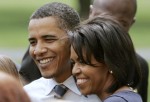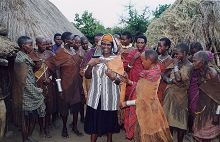
The African press has embraced Democratic presidential candidate Barack Obama as one of their own and as a politician who can bring hope to the world. Amid this acclaim, however, are voices warning against unrealistic expectations.
Their enthusiasm for Obama was notably expressed by Ike C. Ibe, writing in Leadership (Abuja, Nigeria), who invoked the memory of Martin Luther King, Jr. in an article headlined, “Obama’s America Free At Last.” Ibe writes that his own 7-year-old and 9-year-old daughters, who live in the United States, scream when they hear Obama discussed: “They now feel the dream of Dr. Marin Luther King, when the day that the sons of slaves and sons of slave owners will sit together on the table of brotherhood has now become real,” he writes. “They feel now Dr. King’s hope of a time when Americans will no longer look at the color of their skin, but rather, the content of their character.”
Godwin Yaw Agboka, a columnist for the Public Agenda of Accra, reflects his own country’s excitement over the candidate. He says Obama represents change and is more than just a black candidate, a son of Africa. “Obama has transcended race,” writes Agboka. “He talks about hope, and believes that ‘there is nothing false about hope.’”
In a survey of the continent by reporters from The Nation (Nairobi, Kenya), many said that Obama would bring real change in their countries and the world.
In Ethiopia, Kirtukan Mideksa of Ethiopia’s opposition party, said that U.S. President George W. Bush backed the tyrant Meles Zenawi who had ended hope of democracy in Ethiopia. She said that if Obama became president, he would be more likely to oppose Zenawi. “I am sure he (Senator Obama) would restore basic civil rights, which many are being denied in the name of war on terror all over the world,” she said. She added that she hoped African leaders would learn from Obama to respect their rivals instead of provoking hatred and confrontation.
Dr. Rewodros Kiros, an Ethiopian who lectures at Harvard, also holds out hope that if Obama were elected, hostile regimes would be in trouble.
The Nation also reported that fan clubs for Obama had sprung up in Uganda and Tanzania and were working on the Internet for his election.
The Nation quoted Peter Tumaini-Mungu, a lecturer at University of Dar es Salaam, who expressed hope that Obama would act for the disenfranchised. “Obama articulates his policies in favor of the poor and marginalized,” he said, “something both African and Tanzania need.”
Also writing in Nigeria’s Leadership, Abdullahi Keni Saint-George compared Obama to John F. Kennedy. He said that with the emergence of China as a world power, pollution, climate change and global warming threatened the planet.
Wrote Saint-George, “I sincerely believe that that phenomenon called OBAMA will duly sign the Kyoto Protocol on the restriction of industrial pollution and checking of CFC and other ozone-gobbling, dangerous gases of which America is the chief culprit.”
These voices of hope ride on a current of skepticism about how much Obama will accomplish. Writing in the Business Daily (Nairobi, South Africa) in an article titled, “Obama Not Popular in South,” Badru Mulumba reports that the Southern Sudanese don’t see a Democratic president doing much for them.
In fact, they say that if he was vying against Republican contender John McCain in Sudan, he would lose. They favor McCain’s hawkish reputation, noting that President Bill Clinton did little to help the Southern Sudanese in the civil war that killed 2.5 million people.
Writing in Financial Mail (Johannesburg, South Africa), Barney Mthombothi sounds an even darker note. While Obama’s election would be historic and “put a different cast and complexion on world affairs,” Africa should not harbor any false hopes, he writes.
“Africa often tends to behave a bit like an unwanted orphan who suddenly discovers a famous uncle, who’ll hopefully wipe away the tears and provide a protective arm,” he writes. But he goes on to note the example of Kofi Annan [the UN chief from Ghana] who he says accomplished little.
Wrote Mthombothi, “Because of his tenuous association with Africa, we will feel entitled to offer our sage advice and allow ourselves to be disappointed, insulted almost, at what we view as his faults or failures. We should relieve ourselves of such burdens. He’s not ours. He doesn’t speak for us. He doesn’t have to. He doesn’t owe us anything. Not a tuppence.”
In the article Africa Cannot Expect Miracles from Obama, Lebohang Thulo reports in Business Day (Johannesburg, South Africa) on a university symposium at which many of the speakers were cynical about Obama’s impact.
South African Member of Parliament Tony Leon said he assessed Obama as “deeply political” despite the idealism pervading his campaign. He called Obama an interventionist, arguing that was unlikely to veer much from current U.S. foreign policy. He noted that Bush was already meeting the expectations Africans had for Obama in providing aid.
Political science professor Achille Mbembe agreed that Obama’s foreign policy would not differ from Bush’s, but noted that Obama wanted to double current development assistance for Africa to $50 billion. He said that much more was needed than humanitarian and emergency assistance to make Africa self-sustaining.
But not everyone believed that he would be able to overcome “difference” and prejudice.
The most pessimistic note came from Dieudonne Zoungrana of Burkina Faso’s L’Observateur Paalga, who said he believed Obama would be defeated in November by the forces of Islamophobia.
NAM reporter Donal Brown spent two years in Nigeria in the Peace Corps.








